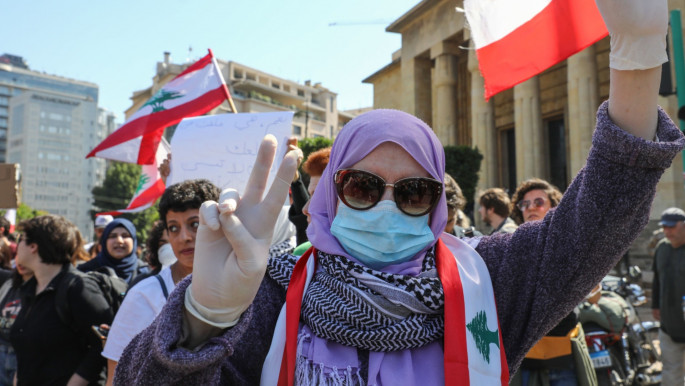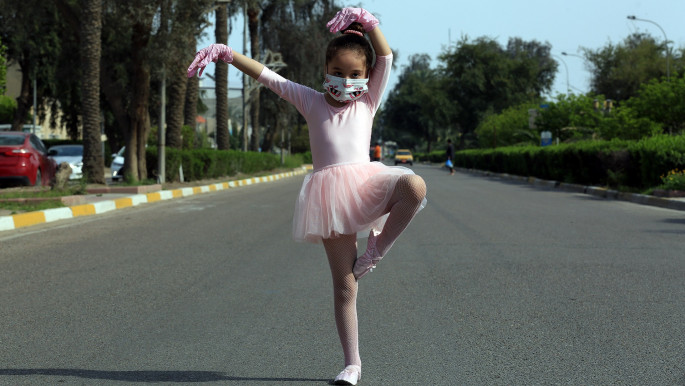Lebanese volunteers launch heroic effort to help health workers battle coronavirus
A recent report by Human Rights Watch (HRW) has shed light on the growing issue of a lack of medical supplies in Lebanon, where over 360 people have tested positive for Covid-19.
The report states that due to the country's dollar shortage, hospitals have been unable to secure basic medical supplies such as masks and gloves.
"The COVID-19 outbreak has placed additional strain on a health care sector already in crisis," HRW's Deputy Middle East Director Joe Stork said.
Read more: Coronavirus in service of authoritarianism
"The Lebanese government has taken swift and broad measures that bought it time, but its ability to manage the outbreak will depend on how it uses this time to secure necessary supplies and provide health care workers with the resources they need."
Lebanon Response Team
Within the health sector, the fear of running out of medical supplies is widespread, with staff trying to ration what available items they have.
 |
Due to Lebanon's dollar shortage hospitals have been unable to secure basic medical supplies such as masks and gloves |  |
"It will be a big problem," Atef Akoum, a medical intern at Rafik Hariri University Hospital (RHUH) where coronavirus patients are being quarantined, told The New Arab.
"Especially if the N95 [mask] is missing, because in some settings, like incubated patients or CPR or nebuliser, the coronavirus becomes aerosol."
Multiple groups, such as the Lebanon Response Team (LRT), have responded to this chronic shortage of supplies by doing what they can to help hospitals.
Consisting of over 300 people, the LRT works remotely from home and is made up of people from various professional backgrounds who are using technology such as 3D printing to make medical supplies for hospitals.
 |
|
| Read more: Lebanon's medical students on the frontline in fighting coronavirus |
The group was started when Hisham Issa and Hussein Hamdan, both engineers, approached Dr Hussein Al-Haj Hassan about starting the initiative.
"They called me," Hassan told The New Arab, "saying that they had this idea and asked me what I think. I said that this is something that we should go forward with. Hisham is an electrical engineer and Hamdan is mechanical, so we wanted to get help from other specialties."
"I posted on Facebook what we needed and what we needed some help in implementing, like with 3D printing, and it went viral. Everyone was contacting me on the phone."
One of these people was Mohammad Al-Haj, a mechanical engineering student in his last year at Phoenicia University, who said that he wanted to get involved to help Lebanon in its time of crisis.
He now manages several of LRT's teams, including one that produces mask shields.
Read more: Coronavirus could kill 100,000 Syrians in Idlib's refugee camps
"I heard about it through Facebook when I saw Dr Hassan's post," Al-Haj told The New Arab. "I sent my name to the group and they gave me the number of Nour Alwan, who is one of the top managers. After that, I was told that I need to join the Slack team, so I joined the website and figured out that we had a lot of experts and volunteers, and even professionals."
Due to the thousands of messages that he was receiving, Hassan spoke with another one of his colleagues about turning the small project into a larger initiative.
 |
The Lebanon Response Team has responded to a chronic shortage of supplies by doing what it can to help hospitals |  |
"Since a lot of people were contacting me, I said, 'Why not move from a small team to a big initiative'," Hassan said.
"I talked to my friend Nour Alwan and we created a platform and called it Lebanon Response Team. This way, everyone can talk with each other, they can form teams, so that we can work not only on ventilators, but on other stuff that the medical sector would need in Lebanon," he added.
"We're working remotely and we meet using online platforms that are available to everyone. When we want to transport something, we're wearing masks, gloves and the device [that is being delivered] is sanitised, there's a company helping us with this."
Financial crisis
In addition to the hundreds of volunteers that have been working on various medical supplies, several companies are providing free aid. The work being done by the LRT is a non-profit project with everything being open source and implemented by anyone.
But the nationwide lockdown and financial crisis has made getting supplies much more challenging, as well as creating the need to self-fund the LRT.
"For the prototypes," Hassan explained, "we have the support of the people inside the initiative, inside the Lebanon Response Team, they are paying from their own pocket. And when we are moving it to the second phase, people that are in that field are helping."
"Lebanon is in a financial crisis. We all know this. And because of this, people are helping. We know that this crisis will not allow for other countries to support us".
 |
|
| The first case of coronavirus in Lebanon was confirmed on 21 February. [Getty] |
The volunteers also rely on financial contributions from Lebanese expatriates.
In order to know what supplies are needed the most, there is a team within the initiative dedicated to contacting hospitals and finding out what they are looking for. Then, once the LRT knows what to build, they manufacture it and send a version to the hospital for testing in the field in order to have medical staff verify that it is suitable for use.
According to Al-Haj, his team working on the mask shields recently finished their prototype and sent them to RHUH.
Read more: The Middle East at war with coronavirus
When he heard back, they told him that the masks were useable except for a minor detail that was quickly fixed by him and his team. They plan to deliver over a thousand masks in the coming days.
"It is a plan B," Al-Haj explained. "Right now they have enough supplies, but if the disease expands in Lebanon, then they will go to plan B. The things that they want the most are the mask shields, the sanitiser and, finally, the suit that protects them from the coronavirus for the Red Cross and for the hospitals."
'Help the Lebanese people'
It is not just companies, though, who have taken note of what the LRT is doing. Imad Hoballah, Lebanon's Minister of Industry, met with Hassan after his Facebook post went viral to discuss what they were doing along with academics and industry figures.
"We had more than one meeting," Hassan stated, "and the idea was to continue developing the solution in order to help Lebanon. So the minister [Hoballah] was actually very supportive."
According to Hassan, the two major focuses of the initiative are time and making sure that what they are producing is useable and will not simply break down.
 |
I work around 11 hours per day in order to help the Lebanese people as much as I can -Mohammad Al-Haj, student |
 |
Because of that, they are looking at the requirements that other governments have for their medical supplies and take great lengths to ensure that everything that they make is as close to meeting those standards as possible.
"A crisis is when we run out of ventilators and the hospitals are not capable of accepting any new patients," Hassan said.
"The biggest focus is time as well as the requirements. We are developing ventilators under the requirements set by the UK Government."
"In Lebanon, we have a lot of talented people, but we do not have the industrial experience."
One of the biggest challenges is that these are supplies made for the medical sector and require rigourous tests. One of the most ambitious projects that the IRT is working on is making ventilators, using 3D printers to make many of the parts for the medical device.
"This project is challenging because it is in the medical sector," he admitted. "So it needs a lot of tests. It needs a lot of validation from several perspectives, especially from a medical perspective. The first thing that we did was conceptual and on paper. We reached the mechanical design and controls and we started developing this more advanced control."
 |
|
| Read more: Positive stories of resilience and bravery from the Middle East this week |
Since the ventilator is a much more complicated piece of technology, the initiative has been experimenting with various types of materials that they print with in order to find the most durable and reliable version of the part.
"Some of the parts are not reliable for a long time," Hassan explained. "For now, we are testing components by creating them from 3D printing."
While many of those working with the IRT are engineers and professionals in their fields, there are still students like Al-Haj who have had to find a balance between their work and studies, which went online following a lockdown on 15 March.
However, this has not deterred people, who still dedicate the vast majority of their day to research and developing prototypes with their teams and plan to continue this work no matter what they have to do.
"I work around 11 hours per day in order to help the Lebanese people as much as I can," Al-Haj said.
Nicholas Frakes is a freelance journalist who reports from London, the Middle East and North Africa.
Follow him on Twitter: @nicfrakesjourno





 Follow the Middle East's top stories in English at The New Arab on Google News
Follow the Middle East's top stories in English at The New Arab on Google News


